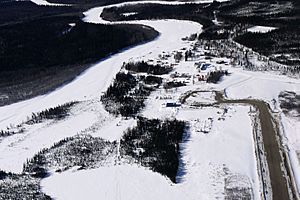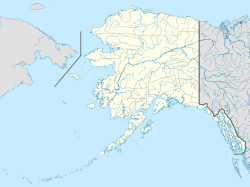Nikolai, Alaska facts for kids
Quick facts for kids
Nikolai
Edze Dochak'
|
|
|---|---|
 |
|
| Country | United States |
| State | Alaska |
| Census Area | Yukon-Koyukuk |
| Incorporated | July 9, 1970 |
| Area | |
| • Total | 4.70 sq mi (12.17 km2) |
| • Land | 4.39 sq mi (11.37 km2) |
| • Water | 0.31 sq mi (0.81 km2) |
| Elevation | 427 ft (130 m) |
| Population
(2020)
|
|
| • Total | 89 |
| • Density | 20.28/sq mi (7.83/km2) |
| Time zone | UTC-9 (Alaska (AKST)) |
| • Summer (DST) | UTC-8 (AKDT) |
| ZIP code |
99691
|
| Area code | 907 |
| FIPS code | 02-54150 |
| GNIS feature ID | 1407022 |
Nikolai is a small city in Alaska, United States. Its name in the local Upper Kuskokwim language is Edze Dochak'. In 2020, about 89 people lived there. The city was officially started on July 9, 1970.
Contents
Where is Nikolai Located?
Nikolai is found in the Yukon-Koyukuk Census Area, Alaska. It is located at about 63 degrees North and 154 degrees West. This is a way to describe its exact spot on a map.
The city covers a total area of about 12.17 square kilometers (4.70 square miles). Most of this area is land, about 11.37 square kilometers (4.39 square miles). The rest, about 0.81 square kilometers (0.31 square miles), is water.
Nikolai's Climate and Weather
Nikolai has a subarctic climate. This means it has very cold winters and mild summers. A weather station near Farewell Lake, about 38 miles south, helps us understand the climate.
Here are some facts about the weather:
- The warmest month is usually July, with average high temperatures around 69.6°F (20.9°C).
- The coldest month is January, with average high temperatures around 8.6°F (-13.0°C).
- It snows a lot in winter, especially in November and December.
- The most rain usually falls in July and August.
| Climate data for Farewell Lake, Alaska, 1991-2020 normals, 1985-2009 extremes: 1060ft (323m) | |||||||||||||
|---|---|---|---|---|---|---|---|---|---|---|---|---|---|
| Month | Jan | Feb | Mar | Apr | May | Jun | Jul | Aug | Sep | Oct | Nov | Dec | Year |
| Record high °F (°C) | 49 (9) |
50 (10) |
53 (12) |
70 (21) |
82 (28) |
88 (31) |
85 (29) |
83 (28) |
77 (25) |
60 (16) |
56 (13) |
51 (11) |
88 (31) |
| Mean maximum °F (°C) | 41.8 (5.4) |
44.2 (6.8) |
46.3 (7.9) |
57.9 (14.4) |
71.1 (21.7) |
79.6 (26.4) |
81.3 (27.4) |
74.7 (23.7) |
66.5 (19.2) |
53.7 (12.1) |
43.1 (6.2) |
42.4 (5.8) |
79.2 (26.2) |
| Mean daily maximum °F (°C) | 8.6 (−13.0) |
21.1 (−6.1) |
28.2 (−2.1) |
44.7 (7.1) |
58.6 (14.8) |
67.6 (19.8) |
69.6 (20.9) |
65.0 (18.3) |
55.8 (13.2) |
38.3 (3.5) |
20.4 (−6.4) |
12.9 (−10.6) |
40.9 (5.0) |
| Daily mean °F (°C) | −1.8 (−18.8) |
9.0 (−12.8) |
14.2 (−9.9) |
33.2 (0.7) |
46.2 (7.9) |
55.1 (12.8) |
58.9 (14.9) |
54.7 (12.6) |
45.5 (7.5) |
28.7 (−1.8) |
10.3 (−12.1) |
3.1 (−16.1) |
29.8 (−1.3) |
| Mean daily minimum °F (°C) | −12.2 (−24.6) |
−3.1 (−19.5) |
0.2 (−17.7) |
21.6 (−5.8) |
33.8 (1.0) |
42.6 (5.9) |
48.3 (9.1) |
44.5 (6.9) |
35.2 (1.8) |
19.1 (−7.2) |
0.1 (−17.7) |
−6.8 (−21.6) |
18.6 (−7.4) |
| Mean minimum °F (°C) | −47.1 (−43.9) |
−38.4 (−39.1) |
−30.8 (−34.9) |
−7.9 (−22.2) |
19.3 (−7.1) |
31.7 (−0.2) |
36.9 (2.7) |
29.1 (−1.6) |
15.1 (−9.4) |
−10.9 (−23.8) |
−30.6 (−34.8) |
−39.8 (−39.9) |
−47.4 (−44.1) |
| Record low °F (°C) | −71 (−57) |
−59 (−51) |
−50 (−46) |
−34 (−37) |
−4 (−20) |
25 (−4) |
31 (−1) |
16 (−9) |
−2 (−19) |
−32 (−36) |
−52 (−47) |
−53 (−47) |
−71 (−57) |
| Average precipitation inches (mm) | 0.79 (20) |
0.53 (13) |
0.35 (8.9) |
0.77 (20) |
1.04 (26) |
1.66 (42) |
2.60 (66) |
2.86 (73) |
2.51 (64) |
2.23 (57) |
1.33 (34) |
0.68 (17) |
17.35 (440.9) |
| Average snowfall inches (cm) | 9.1 (23) |
7.6 (19) |
5.4 (14) |
4.7 (12) |
1.7 (4.3) |
0.0 (0.0) |
0.0 (0.0) |
0.0 (0.0) |
1.9 (4.8) |
11.8 (30) |
12.4 (31) |
10.6 (27) |
65.2 (165.1) |
| Average precipitation days (≥ 0.01 in) | 4.9 | 4.2 | 4.0 | 3.1 | 5.9 | 9.3 | 12.1 | 13.4 | 11.5 | 7.1 | 7.9 | 6.5 | 89.9 |
| Average snowy days (≥ 0.1 in) | 5.7 | 4.8 | 4.4 | 3.0 | 0.8 | 0.0 | 0.0 | 0.0 | 0.6 | 6.0 | 8.4 | 7.2 | 40.9 |
| Source 1: NOAA (1981-2010 precip/snowfall) | |||||||||||||
| Source 2: XMACIS2 (records & 1985-2009 monthly max/mins) | |||||||||||||
Who Lives in Nikolai?
| Historical population | |||
|---|---|---|---|
| Census | Pop. | %± | |
| 1950 | 88 | — | |
| 1960 | 85 | −3.4% | |
| 1970 | 112 | 31.8% | |
| 1980 | 91 | −18.7% | |
| 1990 | 109 | 19.8% | |
| 2000 | 100 | −8.3% | |
| 2010 | 94 | −6.0% | |
| 2020 | 89 | −5.3% | |
| U.S. Decennial Census | |||
Nikolai first appeared on the U.S. Census in 1950. It was a small village back then. In 1970, it officially became a city.
In 2000, there were 100 people living in Nikolai. These people made up 40 households. A household is like a home where people live together. Out of these, 23 were families.
Most people in Nikolai are Native American. In 2000, about 81% of the people were Native American. About 19% were White.
Age and Family Life
The people in Nikolai come in all ages. In 2000:
- About 27% of the people were under 18 years old.
- About 24% were between 25 and 44 years old.
- About 17% were 65 years old or older.
The average age of people in Nikolai was 40 years old.
Many households had children under 18 living with them. Some households were married couples, and some were single-parent families.
Income and Money
In 2000, the average income for a household in Nikolai was $15,000 per year. For families, it was about $15,417 per year. The average income for each person was $11,029.
Some families and people lived below the poverty line. This means they had a very low income. About 21.1% of families and 27.6% of all people were in this situation.
Education in Nikolai
The Iditarod Area School District is in charge of schools in the area. In Nikolai, students go to the Top of the Kuskokwim School.
See also
In Spanish: Nikolai (Alaska) para niños
 | Lonnie Johnson |
 | Granville Woods |
 | Lewis Howard Latimer |
 | James West |


